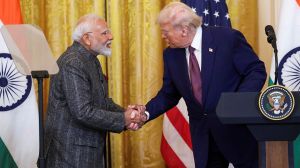Why is RBI squeamish about disciplinary action?
FEBRUARY 19: The Reserve Bank of India RBI Governor said on Friday that he is in favour of a self-regulatory mechanism SRO for Non-ban...

FEBRUARY 19: The Reserve Bank of India RBI Governor said on Friday that he is in favour of a self-regulatory mechanism SRO for Non-banking Finance Companies. He said this self-regulator should have the quot;toughest of disciplinary mechanismsquot;. quot;It is a matter of utmost importance that there should be a method of deterrence so that people follow disciplinary standards,quot; the Governor said. But are we not missing something?
The RBI is currently in charge of supervising finance companies and it has so far failed to recover any money or activate strong disciplinary action against them, other than denying registration to a host of these companies.
Is the RBI merely seeking to transfer its own responsibility to an SRO? After all SROs in India have yet to prove capable of self-discipline and strict supervision. Even in the case of banks, the RBI wants less responsibility. The Governor says that it wants to move from on-site supervision to more documentary supervision. It would appear that the process of abdicating responsibility has already begun. Here is a stunning example of what is going on in the Commercial Paper CP business even when it is under the RBI8217;s supervision.
The case pertains to Bombay Dyeing amp; Manufacturing Company, a pedigreed and cash rich company. In 1998, the RBI was alerted to gross violations of the CP issuing procedure by Bombay Dyeing. ABN Amro Bank which had subscribed to six CP issues totaling Rs 55 crore through a private placement discovered that it was holding forged CP documents. Deutsche Bank was the IPAA Issuing and Paying Arrangement Agent dealer for the company. Specifically, ABN discovered that the numbers on a few CP documents were identical and that it has been given forged documents certified as quot;true copiesquot; by the Bombay Dyeing8217;s Company Secretary. The CP issues were Rs five crore on March 25, 1998, Rs 25 crore on April 4, 1998, Rs five crore on June 4, 1998, Rs five crore on July 6, 1998, Rs 10 crore on July 10, 1998 and Rs five crore on July 13, 1998.
ABN Amro8217;s alert led to an inspection of Deutsche Bank and others in connection with the forgery. ABN8217;s spokesperson says that Bombay Dyeing subsequently regularised the CPs documents and replaced the forged ones. The bank as a policy does not invest in CPs anymore.
The RBI inspection, however, revealed that in 19 of the 61 CP issues by Bombay Dyeing, Deutsche Bank did not have full details. It produced three different lists of CPs issued by Bombay Dyeing which did not match with each other. The RBI investigation also unearthed other CPs where documents were forged 8211; one of Rs 15 crore December 15, 1998 and another of Rs five crore December 24, 1998 were subscribed to by UTI Bank and Times Bank respectively. Later three more cases were discovered 8211; Rs five crore issued on May 19, 1998 subscribed to by ICICI Bank, for Rs 10 crore on the same day, subscribed by IndusInd Bank and Rs 10 crore on May 5, 1998 subscribed by Punjab and Sind Bank.
The RBI reports that the modus operandi was incredibly simple. When Bombay Dyeing needed to issue CPs, instead of registering a fresh IPAA document, it simply took a photo-copy of an old agreement, altered the date, amount, No Objection Certificate etc with correction fluid, made more photocopies of the altered documents and used these as new IPAA documents to raise funds. These were attested by its Company Secretary and counter signed by Deutsche Bank, which did not notice the duplication in numbering. Bombay Dyeing chooses to call the forgery an alteration and a technical problem. In a letter submitted to Deutsche Bank which was collected by the RBI, its finance manager says quot;without any way justifying the irregularities or without in any way attempting to mitigate the seriousness of the irregularitiesquot; that quot;there was a time constraint of high-value clearing time deadline, a photo-copy of an earlier IPAA was used to meet the needs of the moment, by altering the relevant particularsquot;. The company claimsthat after the CP was issued a regular document was prepared and handed over to the subscriber, but it is not sure if this was done in every case. It further confesses that quot;the precaution of withdrawing the photo-copy of the irregular IPAA given earlier to the investor was not taken as a result of which the investor continued to hold both photo-copies. It confesses that quot;while the aforesaid irregularities were a foolish attempt to meet deadlines of time constraints there was no intention whatsoever to raise multiple amounts of CP over and above the CP authorised by the lead bank or any attempt to deceive the investor by photocopies of non-genuine IPAAsquot;. Bombay Dyeing says that it has given conclusive evidence of the rectification of the forgeries to Deutsche Bank.
As regarding the No Objection Certificate from the IPAA agent and the lead bank, it says that this was not available in only two cases amounting to Rs 20 crore subscribed by UTI Bank and Times Bank respectively, and calls these a genuine oversight and says that these alone were not reported. The Bombay Dyeing top brass insists that it was only a technical violation merely to avoid the tedious process of obtaining fresh NOCs for each issue and since it is a cash rich company, this may well be true.
The company further says that it is now in the process of switching its IPAA agent and moving to BNP Bank because it wants to sign an omnibus IPAA agreement which does not require it to seek specific approvals for every fresh issue. Incidentally, Deutsche Bank seems to have chosen to lose the business rather than sign such an omnibus agreement. Amazingly, Deutsche Bank is the only player in the business which denies any of these facts disclosed by the RBI inspection. In a terse statement it merely says that the bank has not at any point received quot;alteredquot; documents, and has stuck to this stand even when told the others involved have not denied the problem.The RBI inspection report does not exonerate Bombay Dyeing but has done nothing to punish it either. The RBI, which wants strict disciplinary action from self-regulatory bodies, has merely set up another committee to overhaul the entire CP procedures with no reference to this case. The committee will only simplify things for corporate houses. The fact that such alterations/forgeries are possible with such ease ought to have set the alarm bells ringing, given that the total outstanding CPs as of September 1999 were a huge Rs 7,658 crore. The involvement of two blue chip foreign banks and a well-known company indicates that the misuse of CPs could well be far more widespread. If the RBI wants strict disciplinary action against violators, that too from self-regulatory bodies, it should start by setting a good example itself.
Author8217;s email: suchetadalalyahoo.com
- 01
- 02
- 03
- 04
- 05































